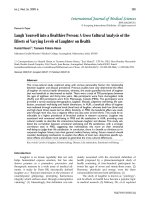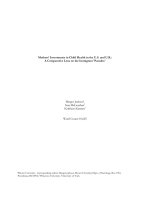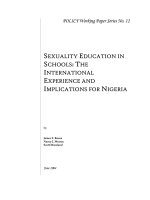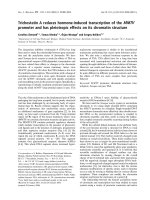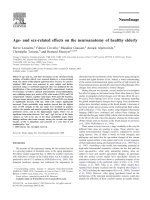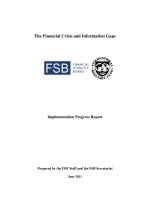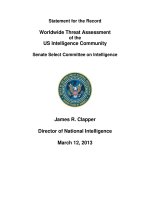The Bush Administrations and Saddam Hussein Deciding on Conflict pot
Bạn đang xem bản rút gọn của tài liệu. Xem và tải ngay bản đầy đủ của tài liệu tại đây (611.76 KB, 209 trang )
Advances in Foreign Policy Analysis
Series Editor: Alex Mintz
Foreign policy analysis offers rich theoretical perspectives and diverse
methodological approaches. Scholars specializing in foreign policy analysis
produce a vast output of research. Yet, there were only very few specialized
outlets for publishing work in the field. Addressing this need is the purpose
of Advances in Foreign Policy Analysis. The series bridges the gap
between academic and policy approaches to foreign policy analysis, inte-
grates across levels of analysis, spans theoretical approaches to the field, and
advances research utilizing decision theory, utility theory, and game theory.
Members of the Board of Advisors:
Allison Astorino-Courtois Zeev Maoz
Steve Chan Bruce M. Russett
Margaret Hermann Donal Sylvan
Valerie Hudson Steve Walker
Patrick James Dina A. Zinnes
Jack Levy Betty Hanson
Published by Palgrave Macmillan:
Integrating Cognitive and Rational Theories of Foreign Policy Decision Making
Edited by Alex Mintz
Studies in International Mediation
Edited by Jacob Bercovitch
Media, Bureaucracies, and Foreign Aid: A Comparative Analysis of United
States, the United Kingdom, Canada, France, and Japan
By Douglas A. Van Belle, Jean-Sébastien Rioux, and David M. Potter
Civil-Military Dynamics, Democracy, and International Conflict: A new
Quest for International Peace
By Seung-Whan Choi and Patrick James
Economic Sanctions and Presidential Decisions: Models of Political Rationality
By A. Cooper Drury
Purpose and Policy in the Global Community
By Bruce Russett
Modeling Bilateral International Relations: The Case of US-China Interactions
By Xinsheng Liu
Beliefs and Leadership in World Politics: Methods and Applications of
Operational Code Analysis
Edited by Mark Schafer and Stephen G. Walker
Approaches, Levels and Methods of Analysis in International Politics
Edited by Harvey Starr
The Bush Administrations and Saddam Hussein: Deciding on Conflict
Alex Roberto Hybel and Justin Matthew Kaufman
The Bush Administrations and
Saddam Hussein
Deciding on Conflict
Alex Roberto Hybel
and
Justin Matthew Kaufman
THE BUSH ADMINISTRATIONS AND SADDAM HUSSEIN
© Alex Roberto Hybel, 2006.
All rights reserved. No part of this book may be used or reproduced in any
manner whatsoever without written permission except in the case of brief
quotations embodied in critical articles or reviews.
First published in 2006 by
PALGRAVE MACMILLAN™
175 Fifth Avenue, New York, N.Y. 10010 and
Houndmills, Basingstoke, Hampshire, England RG21 6XS
Companies and representatives throughout the world.
PALGRAVE MACMILLAN is the global academic imprint of the Palgrave
Macmillan division of St. Martin’s Press, LLC and of Palgrave Macmillan Ltd.
Macmillan® is a registered trademark in the United States, United Kingdom
and other countries. Palgrave is a registered trademark in the European
Union and other countries.
ISBN-13: 978–1–4039–7578–2
ISBN-10: 1–4039–7578–7
Library of Congress Cataloging-in-Publication Data
Hybel, Alex Roberto
The Bush administrations and Saddam Hussein : deciding on
conflict / by Alex Roberto Hybel and Matthew.
p. cm.
Includes bibliographical references and index.
ISBN 1–4039–7578–7
1. United States––Foreign relations––Iraq. 2. Iraq––Foreign
relations––United States. 3. United States––Foreign relations––1989–
4. United States––Military policy. 5. Bush, George, 1924–
6. Bush, George W. (George Walker), 1946– 7. Hussein, Saddam,
1937– 8. Persian Gulf War, 1991. 9. Iraq War, 2003– I.Title.
E183.8.I57H93 2006
956.7044Ј32––dc22 2006046013
A catalogue record for this book is available from the British Library.
Design by Newgen Imaging Systems (P) Ltd., Chennai, India.
First edition: October 2006
10987654321
Printed in the United States of America.
To
Barbara Peurifoy,
David, Karen, and Hanna Kaufman,
and Jeremy Whyman
This page intentionally left blank
Contents
Acknowledgments ix
Foreword by Ronald Steel xiii
Introduction Two Surprises, Two Wars, Two Presidents,
One Family 1
Chapter One Alternative Theories of Foreign
Policy-Making 9
Chapter Two Two Harmful Surprises 19
Chapter Three The Logic of Surprise versus the
Logic of Surprise Avoidance 47
Chapter Four Two Very Different Wars 63
Chapter Five The Apple Sometimes Falls
Close to the Tree 109
Chapter Six The Absence of a Rational Process 145
Notes 155
Bibliography 179
Index 187
This page intentionally left blank
Acknowledgments
Some scholars view teaching as the price they have to pay to do that
which they really love: research. I am not one of them. My research
informs my teaching, but it is through teaching that I often discern
what I do not know. As a result, teaching has on more than one
occasion dictated my research agenda. It is in the classroom, moreover,
that I am repeatedly rewarded by the discovery of students with
tremendous intellectual capacity and energy, waiting to encounter
someone who will take them seriously and provide them with the
opportunity to excel. It was after being exposed to Justin Matthew
Kaufman’s work in one of my seminars that I realized he was such a
student. And that is how our research partnership started.
Throughout the production of this book, Justin was the novice; his
input, however, was so valuable that he merited full coauthorship.
Our work benefited from the research work and comments by a
number of people. A few of them deserve special mention. Cassandra
Lynn Waters, a Connecticut College alum now working in
El Salvador, spent an entire semester looking into the foreign policy-
making literature and summarizing some of the relevant findings.
Stuart Vyse, William Rose, and the anonymous reviewers provided
helpful suggestions. Students in my U.S. foreign policy classes identi-
fied data we had overlooked and alerted me to a number of mistakes
and inconsistencies in earlier drafts. No one, however, contributed as
extensively as Matthew Engel. Of no lesser value is Alexander L.
George’s contribution. Alex never read the manuscript, nor did he
know that Justin and I were working on it; still, though some
23 years have gone by since he served as the director of my dissertation,
his approach to the analyses of foreign policy-making remains deeply
embedded in my mind. To all of them, many thanks.
Many others deserve my gratitude for a number of reasons. The
wisdom, affection, and kindness of my wife Jan; the joyfulness of our
two incredible daughters, Sabrina and Gabriela; the indulgent support
of my in-laws, Barbara and Bob Peurifoy; and the unremitting love
of my mother, Margarita, and her husband, Raymond Lonsbury,
helped nurture my work.
As someone who for most of his early life did not develop deep
roots in any one place, I tended to view comradeship as a temporary
entitlement. This attitude began to change in Los Angeles, under
John Odell and Margaret Gonder’s caring guidance. It experienced
its most consequential conversion during my years at Connecticut
College, in the company of Robert Gay, Alexis Dudden, Fred
Paxton, Sylvia Malizia, Lee Hisle, Julie Worthen, Maria Cruz Saco,
Mary Devins, Susan and Jan Lindberg, Candace Howes, Stuart Vyse,
Frank Graziano, Ybing Huang, Lan-Lan Wang, Tristan Borer, and
John Nugent. For their friendship and the touch of levity they often
add to my life, I am thankful.
One person deserves additional words of appreciation. More than
two decades ago, while I was trying to complete my dissertation, my
mother-in-law, Barbara Peurifoy, kindly volunteered to type and edit
it. Since then, no one has helped me more, or could have been more
patient in my writing endeavor, than Barbara. One particular
instance is worth mentioning. After reading a passage that she found
incomprehensible, she called and asked me to clarify it. For reasons
unbeknownst to me (cockiness maybe), I said: “It is a complicated
argument; people in my field will understand it.” Calmly, she
responded: “Alex, obviously I don’t know the subject as well as you
do, but I am an intelligent person. If I don’t understand it, it means
it is not written well.” She was right. Since then, every time I write
something of some significance, I ask myself: “Will it measure up to
x / acknowledgments
Barbara’s standards?” Despite her tenacity, I continue to make
mistakes, but I am their sole owner. I dedicate this book to her.
Alex Roberto Hybel
Stonington, CT
One of my favorite songwriters once wrote of his success: “I find it hard
to explain how I got here . . .” Having my name attached to this book
gives me a new appreciation of the utter humility that a man must feel
when he sings that line in front of sold-out arenas and stadiums.
For as long as I can remember, I have been something of a
dreamer. In school my teachers reported on this behavior to my
parents with phrases like “he has so much potential,” or “he clearly
has good ideas”; phrases that were inevitably followed by the
less-than-flattering “but his head always seems to be elsewhere.” Of
course my head was always elsewhere; it was drawing blueprints for
my next big idea. I have always believed the greatest achievements or
ideas are those that are original, unique, and progressive in content.
By now I have realized that the process of arriving at such thoughts
is often, at best, unavailing.
Nonetheless, in the course of my pursuits, three people have seen
my lofty goals and ideas as more than just extravagant dreams. In this
forum I would like to simply recognize two of them by name— Noah
Siegel and Alex Sandman. Your faith in me is my fuel for every day.
The third person is Alex Roberto Hybel. There are several good
films that document the relationship between a student and a pro-
fessor, that is, Good Will Hunting, The Emperor’s Club, and Dead
Poets’ Society. Working with Alex while at Connecticut College and
during the 18 months following my graduation felt nothing short of
movie-like. Alex has been inspiring to me in the same way that the
Robin Williams’ character ( John Keating) was inspiring to his
students in Dead Poets, Society. In our regular meetings to discuss our
respective responsibilities and the direction of this book, I had the
rare opportunity to discuss any and every idea born in my mind with
acknowledgments / xi
him, and have the ideas listened to and scrutinized. In my academic
experience, a relationship of this nature between a student and a
professor is rare, and I am grateful to have been lucky enough to
cross paths with Alex. Thus, as per my acknowledgment, I thank the
most inspirational professor of my academic life, Alex Roberto
Hybel, for giving me the tools to think critically about the world of
politics and foreign policy-making, and the confidence to voice those
thoughts. I hope our paths cross many times in the future.
Justin Matthew Kaufman
New York, NY
xii / acknowledgments
Foreword
Ronald Steel
Should we expect the decision to go to war to be rational when so
much else about human life is not? Of course we do expect this, and
we are often disillusioned. This illuminating study of the two recent
American wars in Iraq is a case in point. It asks why, and then
demonstrates how; emotion rather than reason guided the decisions
to go to war. In doing so it reminds us once again that even in the
affairs of state, the heart has its reasons that reason does not know.
No activity of a state demands more of its citizens or evokes more
fervent emotions than does war. Yet few are subject to less hard
analysis by those who make the critical decisions. This distressing
axiom is splendidly illustrated by Alex Hybel and Justin Kaufman.
With precision and intellectual objectivity they demonstrate, on both
a theoretical and a practical level, how emotion and wishful thinking
supplanted rationality in the two Iraq wars.
War is, of course, always unpredictable, both in its course and in
its consequences. For this reason those who embark upon it tread
upon uncertain ground. They should be wary, but almost without
exception the instigators of war are dramatically bold. They believe
that they can control the consequences of their actions.
In defense of their bold actions they sometimes cite Clausewitz,
who famously argued that war is the pursuit of politics by other
means. But they do not take to heart the warning inherent in his
famous dictum. If war is indeed the pursuit of politics, then it is
obviously subject to all the irrationality, hyperbole, and dishonesty of
the political arena. War is just as haphazard, unpredictable, and
irrational as any other form of human behavior. History and
literature are replete with examples.
Indeed it would be heroically difficult to prove the contrary. Yet
such is our human proclivity to war—indeed our attraction to it—
that we want to believe war occurs because the reasons for it are over-
whelming and ineluctable—and even more, that the ultimate
consequences can be known and controlled. If we did not naively
believe this we might be less inclined to pursue it.
War is a staple of human behavior. It is doubtful that there has
ever been a moment when it was not taking place somewhere or
other on our planet. The scale varies according to the capacity of the
participants. And the rationale depends on the usual factors of fear,
greed, ambition, hate, opportunity, ignorance, and delusion, to
name the most obvious.
In some cases wars seem to break out with stunning spontaneity,
like powder kegs that apparently ignite on their own. But on closer
inspection one notes that someone filled the powder kegs, or put
them in a hazardous place, or inflated their importance. Powder
kegs are often the pretext rather than the primary cause for war.
Their significance usually lies not in the event itself, but rather in
the reaction to it.
War is, by its very nature, never a one-sided affair. One side may
initiate and the other side respond, but that is only the narrative part
of the story. The more important question lies in why nations delib-
erately choose war and believe it will necessarily advance what they
perceive to be their interests.
Some states are simply aggressive and seek continental or even
global domination. This is an ambition that they usually describe in
idealistic terms, such as “advancing civilization,” “world order,” and the
like. More commonly, a state may launch a war for what its leaders
assert to be “defensive” reasons.
Among these is the perceived need to attack before being
attacked. While this is essentially an aggressive act, it is often justi-
fied by those who commit it as “preemption,” or more vaguely as
xiv / foreword
“preventive war.” A particularly egregious example of this would be
Nazi Germany’s invasion of Poland and later of the Soviet Union.
The attacked nation may, indeed usually does, choose to respond
in kind, and in this case a full-fledged war takes place. We then say
that the nation being attacked is forced into fighting a defensive war.
But of course not all nations respond to aggression by resisting their
attacker. Some simply surrender.
That may be viewed as a cowardly reaction. It certainly is not con-
sidered to be heroic. But in some cases, of which history furnishes
myriad examples, it may be deemed a practical way of dealing with
overwhelming odds and making the best of a hopeless situation.
One variant for a weak state in the path of a powerful aggressor is
to proclaim its neutrality and to be as unobtrusive and cooperative as
possible. Such states in certain cases can be more useful to the aggres-
sor as formal “neutrals” than as occupied territories. This was the
path chosen by Sweden and Switzerland in World War II.
There is no all-purpose formula for explaining why nations
launch aggressive wars or why they respond as they do to the threat
(real, perceived, imagined, or manipulated) of aggression (actual,
potential, or contrived) against them. This depends on the nature
of the state, the psychology and ambitions of its leaders, and an
assessment of the costs and benefits of going to war.
The human factor is clearly critical. Those in control of a state—
whether elected, crowned, or self-appointed—make the decision
between war and peace. The general assumption is they do so for rea-
sons that appear to be rational to them, at least at the time. For its
part the public, which in a democracy must theoretically approve the
decision to go to war, has to be persuaded that its leaders are reacting
rationally and in the public’s general interest.
This is how it is supposed to work. But the burden of proof is
greater on the elected leaders when the war is aggressive rather than
defensive—that is to say, if it is a war of choice rather than a war of
necessity, a war the nation launches rather than one it responds to.
The war in Vietnam represents the former, World War II the latter.
foreword / xv
The former, largely because of its results, is regarded as embarrassing
and even shameful, the latter is extolled as “the Good War.”
Good wars inspire heroic stories; bad wars provoke a search for
explanations. This book is a particularly thoughtful explanation of
how emotion and ambition undermined rationality in the Iraq wars
of the two George Bushs. The prose of these two authors is cool,
their reasoning rigorous, and their conclusions both sobering and
highly instructive.
xvi / foreword
Introduction
Two Surprises, Two Wars, Two
Presidents, One Family
The Analytical Problem
On August 1, 1990, Iraqi troops rolled into Kuwait. During the two
weeks prior to the invasion, members of the U.S. intelligence com-
munity had monitored the deployment of Iraqi forces, and several of
them had concluded that Saddam Hussein intended to invade
Kuwait. The intelligence evaluators forwarded their analyses to the
top members of George H. W. Bush’s administration, who refused to
validate the conclusions until just a few hours before the start of the
invasion. For the next few days, Bush and his senior advisers met to
discuss Iraq’s action and the manner in which the United States
should respond. Prior to the second meeting, however, the president
and his national security adviser had agreed that the United States
could not tolerate Iraq’s belligerent act and should use military force,
if necessary, to expel the invaders. In view of their decision, the other
senior advisers had no choice but to concur. Some time later, while
the Pentagon was in the process of devising its military strategy, the
senior foreign policy-makers in the Bush administration hastily
decided that they would confine the operation to the extraction of
the Iraqi forces from Kuwait and would refrain from marching
toward Baghdad with the intent of overthrowing Saddam Hussein’s
regime.
In 2001, a second member of the Bush family was encumbered by
a conspicuously more costly surprise attack. On September 11, three
planes flown by al Qaeda operatives crashed against three major U.S.
buildings—two in New York and one in Washington.
1
Within the
span of a few days, President George W. Bush ordered preparations
for an attack on Afghanistan. In November, after learning that the
United States and its allies had nearly succeeded at forcing the
Taliban regime and al Qaeda members to abandon their strongholds
in Afghanistan, the president directed Secretary of Defense Donald
Rumsfeld to design a plan to topple Saddam Hussein’s regime. Some
16 months later, Bush authorized the invasion of Iraq.
Rationality and Foreign Policy-Making
Foreign policy-making is about choices. World War II convinced
Hans Morgenthau that its horrendous costs could have been curbed
had the United States, Britain, and France acted earlier to block
Germany’s hegemonic aspirations. As a result, he proposed that in
order to avoid repeating the same mistake foreign policy-makers
must act rationally.
2
Since then, students of international politics
have viewed rationality as the cornerstone of foreign policy-making.
They concede that the practice of rationality does not guarantee the
design of a successful policy; but they also contend that its recurrent
absence eventually generates costly results to the entity the foreign
policy-formulators are assigned to represent and protect.
Our analysis is steered by a set of interrelated interests. Our lead-
ing goal is to build a theoretical construct that captures the nature of
the decision-making processes of the two Bush administrations. To
achieve this objective we explicate and compare the way the two
Bush administrations addressed the Gulf and Iraqi crises. As part of
the analysis, we assess whether each administration deviated from the
rational process during the crises, and if they did, we single out the
factors that affected the procedures. Though originally we also
intended to analyze the Afghan case, we soon realized that the policy
initiated by the second Bush administration during the days
preceding the attack on Afghanistan could best be explained by a
simpler approach to the study of foreign policy.
2 / the bush administrations and saddam hussein
The study of a president’s foreign policy-making process is vital
when the international problem he and his principal advisers
addressed could have been dealt with differently by another group of
decision-makers. The September 11 attacks on the United States left
Bush and his senior advisers very little room to maneuver. Even if a
different administration had led the United States at that time, it is
inconceivable to think that it would not have responded with an act
of war against Afghanistan had its regime refused to acquiesce to
Washington’s demands. As explained by realists, an act of war against
any actor, but particularly against the most powerful entity in the
world, forces its leaders to respond in form. Failure to do so would
undermine its prestige and, possibly, its relative power.
3
The most one
could conjecture at this stage is that a president other than George W.
Bush, surrounded by a different group of advisers, might have opted
for a different war plan. Quite possibly, a different president might
not have been so driven by the conviction that he needed to respond
immediately, or might have been advised by a secretary of defense
who would have used a different plan of attack. Such distinctions,
although important, are not pertinent to our investigation.
To help realize the previously identified analytical goals, our work
focuses on the following questions:
1. Did George H. W. Bush and his senior foreign policy advisers
have sufficient information to deduce that an attack on Kuwait
by Iraqi forces was highly probable? If they did not, why not?
If they did, what compelled them to ignore the threat?
2. Did George W. Bush and his senior foreign policy advisers
have the necessary information to infer that a direct attack on
U.S. soil by al Qaeda operatives was highly likely? If they did
not, why not? If they did, what impelled them to disregard the
warnings?
3. Did George H. W. Bush and his senior foreign policy advisers
study thoroughly the problems generated by the Iraqi invasion
of Kuwait? What options did they assess before deciding on the
two surprises, two wars, two presidents, one family / 3
use of military force against Iraq? What induced the president
to resort to military force to drive Iraq out of Kuwait?
4. Did George H. W. Bush and his advisers assess carefully
whether or not to try to overthrow the Saddam Hussein regime
in Iraq? What convinced the president not to try to overturn
the Iraqi regime?
5. Did George W. Bush and his senior foreign policy advisers
study meticulously the problems caused by the Saddam
Hussein regime? What choices did they consider before decid-
ing on the use of military force against the Saddam Hussein
regime? What propelled the president to resort to military
force to topple the Iraqi regime?
6. Did George W. Bush and his advisers analyze scrupulously the
viability of instituting a democratic regime in Iraq? What
convinced the president that it would be feasible to set up a
democratic regime in Iraq?
Structure of the Book
To answer the questions mentioned earlier, assess whether the Bush
administrations approached their respective foreign policy-making
processes rationally, and offer a theoretical explanation for their deci-
sions, we have divided the book into six parts. In chapter one we
conduct a brief tour of the main foreign policy-making theories thus
far devised, but refrain from positing our own. We favored this path
because we concluded that it would be markedly more helpful to
allow the data to speak for itself instead of imposing on it a precon-
ceived construct.
In chapter two, we describe the information each administration
examined prior to the surprise attacks, as well as some of the conclu-
sions different members derived. In the case of the first Bush admin-
istration we focus also on the negotiations and discussions some of
its leading members carried on with Saddam Hussein and several
other Middle Eastern leaders during the period prior to the invasion.
In chapter three we analyze the logic behind strategies of surprise,
4 / the bush administrations and saddam hussein
consider the measures the potential victim must take in order to
avoid becoming an actual victim, and determine whether either Bush
administration could have averted being surprised. We conclude that
the first Bush administration had the information necessary to infer
that Saddam Hussein intended to invade Kuwait, that several intelli-
gence analysts alerted leading members of the administration that an
attack was highly probable, and that responsibility for refusing to
heed the warnings fell squarely on the shoulders of the Bush admin-
istration’s central figures. We also explain why those same leaders
were disinclined to take note of the warnings.
In our analysis of the second Bush administration and its inability
to prevent the September 11 surprise attacks, we concur with some
of the conclusions arrived at by The 9/11 Commission Report. It is dif-
ficult to contend, without the aid of hindsight, that had those
responsible for tracking the activities of the potential terrorists been
more competent, they would have been able to forewarn the senior
members of the Bush administration in a timely manner and, conse-
quently, that the attacks would have been averted. It is fair to note,
however, that the intelligence gatherers failed to share information,
conduct insightful and imaginative analyses, and initiate useful coun-
terterrorist operations, and that their errors magnified the would-be
surprisers’ opportunity to succeed. The opportunities to the would-
be surprisers were further augmented by the refusal on the part of the
Bush administration’s senior members to identify al Qaeda “as a first
order threat” in their original foreign policy agenda.
We start chapter four with an examination of the first Bush
administration’s two decisions—to rely on force to free Kuwait from
Iraq and to refrain from marching toward Baghdad in order to top-
ple the Iraqi regime. In the next section, we scrutinize George W.
Bush’s decisions to go to war against Iraq and to replace its leadership
with a democratic regime. In chapter five we conduct a detailed
investigation of the decisions formulated by both administrations.
Our analysis of the first Bush administration does not generate a
simple conclusion. We contend that from early on President Bush
and his national security adviser, Brent Scowcroft, defined the nature
two surprises, two wars, two presidents, one family / 5
of the problem, the goals the United States would pursue, and the
policy it would implement, with very little input from the other senior
foreign policy-makers. More to the point, we argue that the decision-
making process was void of any traces of rationality. It was dictated
mainly by the president’s deep anger against Saddam Hussein and
instinctive fear of repeating the mistakes committed by France,
Britain, and the United States when they refused to respond aggres-
sively to Adolf Hitler’s expansionist strategy in the 1930s. The
absence of a systematic analysis was balanced by the president’s deci-
sion to authorize the military to use whatever means it needed in
order to bring about victory at minimal cost to the United States. In
the examination of the first Bush administration’s decision not to try
to topple Saddam Hussein’s regime, we argue that it was the result of
a process generated by the belief that no one in Washington knew the
kind of political system that would replace the Saddam Hussein
regime, that any attempt to create a pro-U.S. government would
spawn very high costs and would require extensive U.S. involvement
for a lengthy period, and that it would alienate the leaders of those
states who had helped in the fight against Iraq.
With respect to the second Bush administration, we postulate that
it decided on war against Iraq knowing that the intelligence it
possessed about Saddam Hussein’s intentions and actions was incon-
clusive, and that it refused to give serious thought to other alterna-
tives and to the various obstacles it would encounter in its drive to
transform Iraq into a democratic state. This case demonstrates the
extent to which an administration is prepared to ignore information
that disputes, or casts doubt on, the rationale of its political agenda if
its president demands immediate action, is deeply confident of his
ideology and “gut feeling,” and disparages disciplined thinking.
In chapter six we configure the various conclusions in the form of
a general theoretical construct. The maxim “the apple never falls far
from the tree” is partially applicable to this study. Many of the traits
revealed by Bush senior during his handling of the Gulf crisis
reemerged during his son’s preparation for the war against Iraq.
6 / the bush administrations and saddam hussein
Each president, rather than engaging in a systematic comparison
of viable options, relied on his instinct when formulating the deci-
sion, and used moral language to justify his choice. Compelled to
ensure that no one questioned his personal courage and motivation
to “do the right thing,” each leader also refused to reconsider his
original decision. Both administrations used historical analogies as
part of their decision-making process. The Munich fiasco and the
1989–1990 Panama crisis informed the decisions by the first
President Bush. The human costs absorbed by the U.S. military in
Vietnam and Lebanon dictated the strategy opted by his military
advisers at the Pentagon. Two historical cases influenced the second
president’s decision-making process. The September 11 tragedy con-
vinced him that permitting Saddam Hussein to remain in power was
an unacceptable risk. In addition, the United States’s success at trans-
forming Germany and Japan into stable and friendly democracies led
him to believe that he could replicate the task in Iraq. For many of his
advisers, Saddam Hussein’s deceptive behavior during the 1990s
validated the use of military force against him and his regime. A few
linked the Iraqi’s leader behavior to Adolf Hitler’s policies in the mid-
1930s and the refusal on the part the United States, Great Britain,
and France to counter forcefully straight away.
The effects of organizational and psychological impediments to
rational foreign policy-making are captured by the “noncompensatory”
decision-making theory. The construct postulates that foreign policy-
makers, instead of comparing both the positive and negative aspects
of a number of viable options, stress the positive factor of its favored
policy and the negative elements of other alternatives. The theory is
successful at encapsulating the approach to foreign policy-making by
the two Bush administrations.
two surprises, two wars, two presidents, one family / 7
This page intentionally left blank
